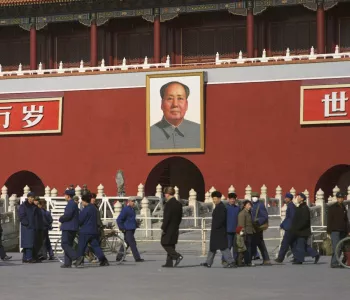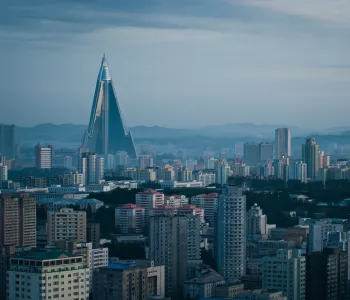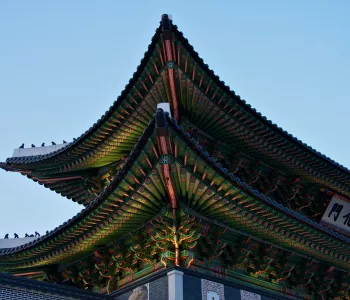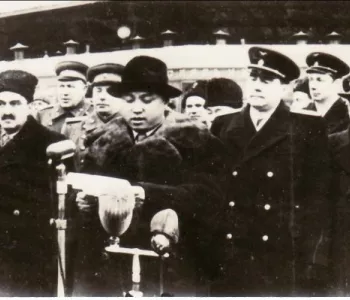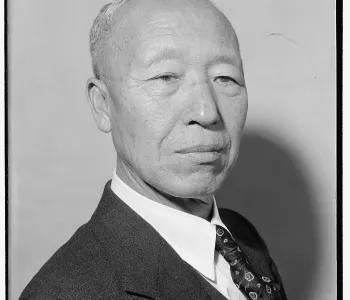d'Vinci

Gu, Kim 1876- 1949
Kim worked with Syngman Rhee following Korean independence but opposed the UN decision to establish a Korean government only in the South.

KIM GU (1876-1949). Born in Haeju, Hwanghae Province, Kim Gu joined the Donghak movement in 1893. Fleeing to Manchuria in 1895, he joined the contingent of the Righteous Armies there, but he returned to Korea to fight the Japanese. Imprisoned for his killing of a Japanese army officer in 1895, he managed to escape from the prison in 1898. He was briefly a Buddhist monk until he became a Christian in 1903, teaching at a mission school. In 1911, he was arrested in connection with the so-called 105 Persons Incident, serving a prison term until 1914. After that, he was involved in the Rural Enlightenment Movement until he joined the March First Movement in 1919.
Fleeing from Korea to Shanghai in 1919, Kim became one of the founders of the Korean Provisional Government in exile, serving as its chief of security, minister of home affairs, and then premier. In 1930, he and others formed the Korean Independence Party and directed terrorist activities against the Japanese. In 1935, he established the Korean National Restoration Army in China, and he served as the president of the Provisional Government in Chongqing from 1944.
Returning to Korea in October 1945, as head of the Provisional Government with his Korean Independence Party, Kim and Syngman Rhee collaborated as leaders of the rightist movement for a while. Kim served as vice president of the National Council for Rapid Realization of Korean Independence, and vice-chairman of the Representative Democratic Council.
As the controversy grew over the implementation of the United Nations (UN) plan to establish a Korean government by having general elections only in the South, Kim opposed the UN plan, becoming a bitter political rival and critic of Rhee. He and others made vain efforts to solve the Korean question by Koreans themselves and prevent the permanent division of Korea. Kim and some of his supporters even went to Pyongyang and met the North Korean communists, but were unable to reach an agreement.
Kim refused to take part in the founding of the Republic of Korea. An army officer, An Du-hui, assassinated him on 26 June 1949. An was sentenced to life imprisonment, but soon released. An lived under a false name until he was murdered in Seoul in October 1996.
All rights reserved. No portion of this publication may be reproduced, stored in a retrieval system, or transmitted in any form by any means, electronic, mechanical, photocopying, recording or otherwise without the prior written permission of the publisher. (Historical Dictionary of the Republic of Korea, by Andrew C. Nahm and James E. Hoare, published by RLPG Books, appears by permission of the author and publisher).
Fleeing from Korea to Shanghai in 1919, Kim became one of the founders of the Korean Provisional Government in exile, serving as its chief of security, minister of home affairs, and then premier. In 1930, he and others formed the Korean Independence Party and directed terrorist activities against the Japanese. In 1935, he established the Korean National Restoration Army in China, and he served as the president of the Provisional Government in Chongqing from 1944.
Returning to Korea in October 1945, as head of the Provisional Government with his Korean Independence Party, Kim and Syngman Rhee collaborated as leaders of the rightist movement for a while. Kim served as vice president of the National Council for Rapid Realization of Korean Independence, and vice-chairman of the Representative Democratic Council.
As the controversy grew over the implementation of the United Nations (UN) plan to establish a Korean government by having general elections only in the South, Kim opposed the UN plan, becoming a bitter political rival and critic of Rhee. He and others made vain efforts to solve the Korean question by Koreans themselves and prevent the permanent division of Korea. Kim and some of his supporters even went to Pyongyang and met the North Korean communists, but were unable to reach an agreement.
Kim refused to take part in the founding of the Republic of Korea. An army officer, An Du-hui, assassinated him on 26 June 1949. An was sentenced to life imprisonment, but soon released. An lived under a false name until he was murdered in Seoul in October 1996.
All rights reserved. No portion of this publication may be reproduced, stored in a retrieval system, or transmitted in any form by any means, electronic, mechanical, photocopying, recording or otherwise without the prior written permission of the publisher. (Historical Dictionary of the Republic of Korea, by Andrew C. Nahm and James E. Hoare, published by RLPG Books, appears by permission of the author and publisher).

